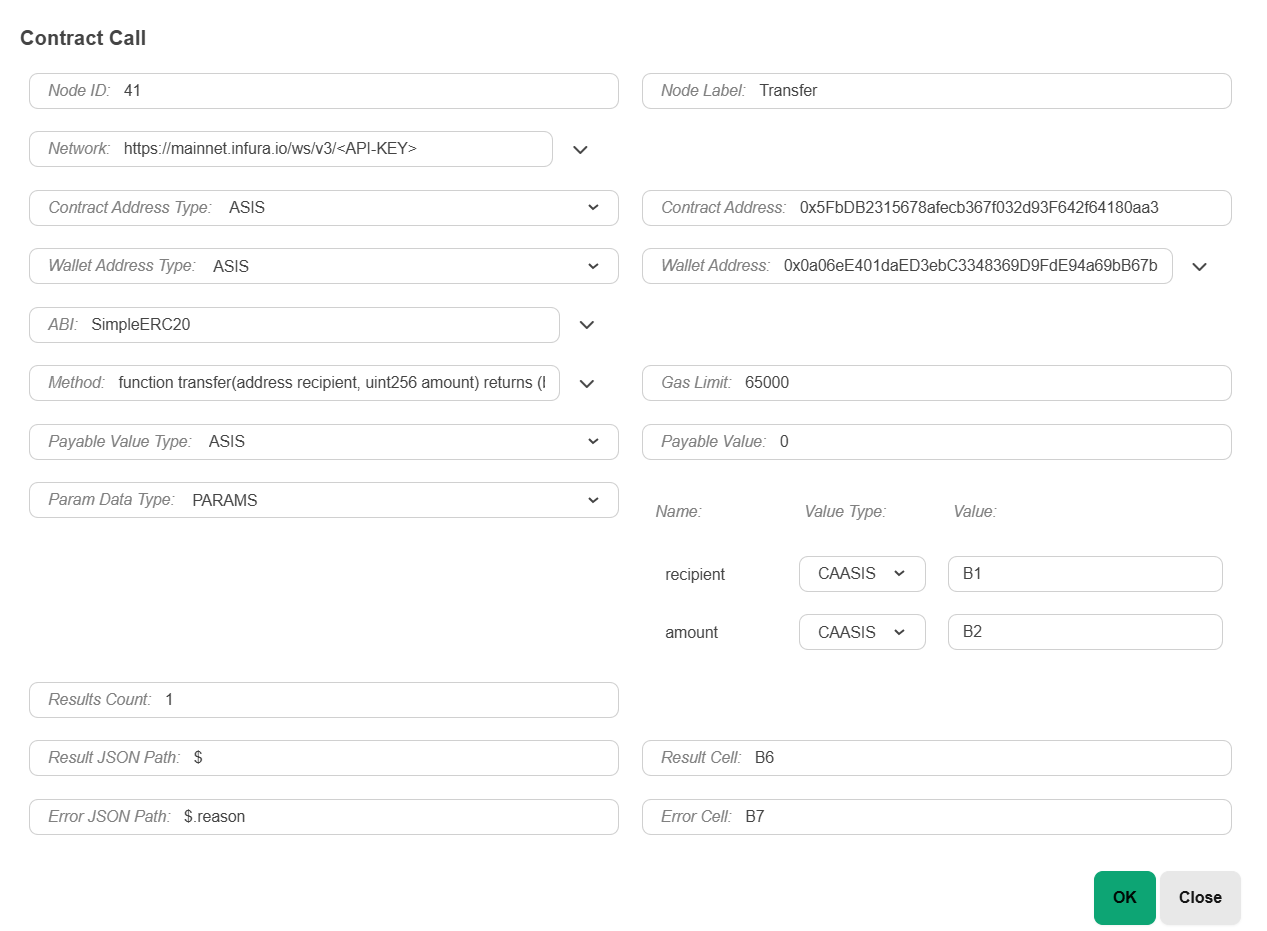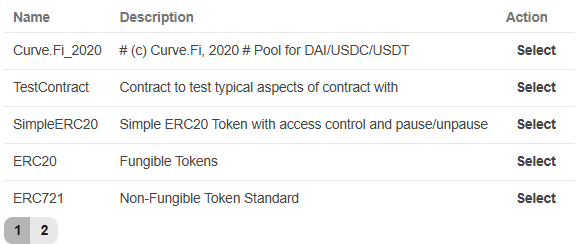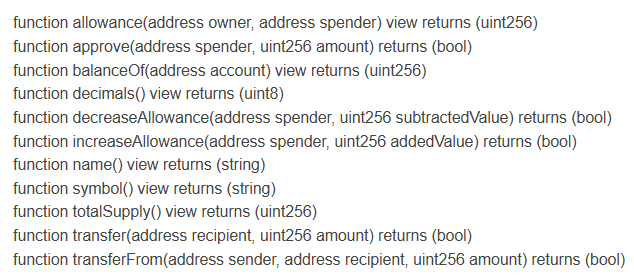WorkFlo Designer - Contract Call Node
This node is an assignable node that is used to call a function of a specific contract on the blockchain. It allows the function call to use values from the spreadsheet for the method call parameters, and it will write the outcome of the contract call to the spreadsheet. If the contract call must be signed, it will either prompt the user via the EIP-6963 injected Wallet Provider to sign the transaction, or it will sign the transaction with the built-in Petty Wallet, or it will initiate an M-of-N signing ceremony, whichever wallet type was configured to be used.

Properties
Node ID
Auto-generated node ID. Read only.
Node Label
The label of the node to be displayed on the workflow canvas.
Network
The Web3 API endpoint to use. This endpoint must be compatible with the underlying Ethers v6 library. This URL will typically include your API key.
Contract Address
The address of the contract to call. This value can be a hardcoded blockchain address, or it can be a spreadsheet address which resolves to a blockchain address.
Contract Address Type
The type of the contract address.
- ASIS - As-is. The Contract Address value will be used as is.
- CELLADDRESS - Cell Address. The Contract Address value will be interpreted as a spreadsheet address and the value at that address will be used as the contract address.
Wallet Address
The address of the wallet to use for the contract call. This value can be a hardcoded blockchain address, or it can be a spreadsheet address which resolves to a blockchain address. This is not a free-form address field and must be an EIP-6963 injected Wallet Provided address of the user to whom the contract signing task will be assigned, or it must be a Petty Wallet address, in which case the transaction will be signed automatically without any human intervention, or it needs to be signed via an M-of-N signing ceremony using the built-in M-of-N Wallet.

ABI - Application Binary Interface
The ABI (Application Binary Interface) is a JSON representation of the contract's methods and events. It is used to encode and decode the data sent to and received from the contract. The ABI allows the application to interact with the contract by providing the necessary information to call its functions and handle its responses.
The system has a few standard ABIs available, but additional ABIs can be added using the Contract ABI application.
You can select an ABI using the dropdown below.

Method
The method on the contract to call. If the contract function is a view function, it will not initiate a signing request. If the contract function is a non-view function, it will initiate a signing request as required by the Wallet Address property.
You can select any of the available methods on the ABI using the dropdown. See the example of an ERC20 contract below.

Gas Limit
The maximum amount of gas that the transaction is allowed to consume. If the transaction requires more gas than the specified limit, the transaction will fail with an out-of-gas error.
Payable Value Type
The type of the value to send with the transaction. This value can be a hardcoded value, or it can be a spreadsheet address which resolves to a value.
- ASIS - As-is. The Payable Value value will be used as is.
- CELLADDRESS - Cell Address. The Payable Value value will be interpreted as a spreadsheet address and the value at that address will be used as the payable value.
Param Data Type
The data type of the parameters to be passed to the contract method. The data type can be one of the following:
- ENCODED - The parameters are already encoded in hexadecimal format and will be passed to the underlying contract call function as-is (The function selector should not be prepended onto the method parameters).
- PARAMS - The parameters are a list of values that will be passed to the underlying
contract. When this option is selected, a table of parameters will be displayed where the
user can enter the values to be passed to the contract.
- Name - The name of the parameter.
- Value Type - The type of the value to be passed. The value can be one of the
following:
- ASIS, As-is: The value is used as is.
- JSON: The value is parsed as a Javascript object. This is an advanced feature used for complex object parameters.
- CAASIS, Call Address, as-is: The value is interpreted as a spreadsheet address and the value at that address will be used as the parameter value.
- CAJSON, Call Address, JSON: The value is interpreted as a spreadsheet address and the value at that address will be parsed as a Javascript object.
- Value - The value of the parameter.
- JSON: The value is parsed as a Javascript array. This is an advanced feature used for complex object parameters.
- CAJSON, Call Address, JSON: The value is interpreted as a spreadsheet address and the value at that address will be parsed as a Javascript array to be used as the function parameters.
- CARAW, Call Address, Raw: The value is interpreted as a spreadsheet address and the value at that address will be used as the complete blockchain call parameter value. This will ignore the selected ABI method as its function selector should already be prepended onto the encoded call parameter.
Results Count
The number of results you want to extract from the contract call outcome. The outcome of the contract call will either be a log entry for a non-view contract call, or the return value from a view function. The results count will determine how many Result JSON Path and Result Cell pairs you can specify.
Result JSON Path
A JSON path expression to extract the results from the contract call outcome. The JSON path expression must always start with a
$and can use the operators as described by the JSON Path Expression below. If no path expression is specified, the result will be ignored.Result Cell
The spreadsheet address to write the parsed result to.
Error JSON Path
A JSON path expression to extract the message from a possible error result from the contract call. The JSON path expression must always start with a
$and can use the operators as described by the JSON Path Expression below. If no path expression is specified, the error will not be written to the spreadsheet. If it is an interactive method call as determined by the wallet type, any error will always be shown to the user.Error Cell
The spreadsheet address to write the error to.
JSON Path Expression
A JSON path expression to extract the results from the contract call outcome. The JSON path
expression must always start with a $ and can use the following operators:
- $ - The dollar character represents the entire JSON message. If only the dollar sign is specified, the whole JSON message will be written to the spreadsheet. This is helpful during process development.
- . - In the context of a JSON path, the period (.) character is used to separate different keys or elements in the path. For example, in the JSON path "object.key", the period separates "object" and "key".
- [] - The square brackets ([]) are used to access elements in an array. For example, in the JSON path "array[0]", the square brackets are used to access the first element in the array.
